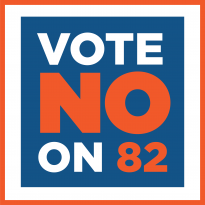You are here
Learn More About Initiative 82 and Support Tipped Employees
What is Initiative 82, and how would it affect restaurant and bar workers?
The District of Columbia Tip Credit Elimination Act of 2021 or Initiative 82 is being considered by D.C. voters this November to eliminate the tip credit for restaurant and bar workers. If passed, this measure will severely reduce take home pay for servers and bartenders across our city.
Under the current system, the tip credit guarantees that servers and bartenders receive the minimum wage but enables tipped employees to earn well above that amount – about $26 per hour, on average, according to the Bureau of Labor Statistics. This is the second highest hourly wage average for servers in the country.
In restaurants that have adopted this model, income for full-time servers and bartenders has fallen by as much as $10,000 per year. Restaurants and bars would face major increases in labor costs and be forced to cut back employee hours and eliminate positions.
Does the current law require employers to ensure tipped workers make minimum wage—$16.10 an hour?
Both Federal and D.C. law require that all tipped employees make the minimum wage through a combination of their base wage plus tips, and strong protections are in place to ensure this happens. Employers must keep records documenting that employees’ earned tips plus base wage equals at least D.C.’s minimum wage. If those earnings ever fall below minimum wage the employer must provide the difference. The penalties for skirting this law are massive, and not a place that employers want to find themselves.
Yet, the reality is restaurant and bar owners rarely have to provide the difference to meet minimum wage because D.C. tipped workers make well above minimum wage – about $26 per hour, on average, or more.
Initiative 82 is an attempt to solve a problem that does not exist in the D.C. restaurant market.
Who is behind Initiative 82 in D.C.?
Initiative 82 is being championed by national special interest groups focused on eliminating the tipped wage system in big national chains across the country.
The reality is that 96 percent of full-service restaurants in D.C. are independently owned. They are responsible for the vibrant restaurant scene that has flourished in our city over the last decade.
Tipped employees and restaurant owners and operators do not want this change. They like the current system because it allows for greater earning potential and allows them to cover their living expenses and more.
What would this mean for D.C. restaurant and bar workers and owners?
This measure would dramatically change the way DC restaurants and bars do business. Restaurants and bars are likely to institute a service charge and eliminate tipping. Servers and bartenders would earn considerably less than they do now through an hourly wage. Restaurants and bars would face major increases in labor costs and be forced to cut back employee hours and eliminate positions.California’s hourly wage is $16.49. California does not have a tip credit and on average their servers are earning $10 less than D.C. servers.
Inflation means menu prices to dine out will continue to increase. If 82 passes, diners will see an even more dramatic increase in menu prices as labor costs significantly increase. 85% of restaurants have already increased menu prices over the past year as they cope with the pandemic.
Would customers still tip?
There is no certainty that will happen. There are different models and approaches they would need to implement in order to remain open, operating and employing workers.
In other states we have seen restaurants raise menu prices, institute a service charge, reduce staff size, or a combination. Service charges legally belong to the restaurant, and most of that fee will be used to reach the minimum wage. The remainder could be distributed however the operator sees fit. It is unrealistic to think a diner will tip on top of a service charge, if they are given the opportunity.
If a diner is expected to tip on top of the service charge the bill would increase by an additional 20% beyond what is typically paid, and will discourage people from continuing to eat out as frequently. Additionally, eliminating the tip credit does not mean that operators need to change or increase compensation for the back of house employees.
How can I get involved?
- Sign up below to receive campaign updates
- Share the website and Twitter and Facebook pages with your friends and neighbors
- Donate to help support efforts to educate D.C. voters on the negative impacts of 82
- And most importantly, vote NO on 82!





















